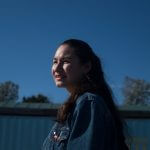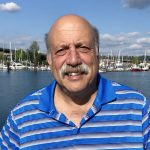Megan Nguyen
San Francisco, California
Megan is the Bay Area Hub Coordinator at Sunrise Movement. At her previous role at California Trout, Megan managed both educational content for social media and programming for outreach events. She believes that uplifting diverse voices in conservation will inspire the next generation of science communicators. Megan is an energetic advocate using her voice to inspire people to turn their passion into action. Her energy and creativity as a musician and organizer shines bright in her activism work with the Sunrise Movement, a national movement of young people fighting for policies that address climate change. She has led strikes, sit-ins, and trainings for Sunrise, and through this work, Megan hopes to empower young leaders to challenge injustice in their communities.
Connect with Megan on social media at @TheMeganPhone on Instagram and Twitter.
This interview was conducted by Carly Schmidt on April 14, 2020. Watch Finding My Voice to learn how Megan started speaking out for water, climate, and justice.
What is your role at California Trout?
CalTrout uses science-based solutions to protect wild fish in healthy rivers, and my job is to share the work we do with the public. I love sharing and seeing the beautiful rivers and places we protect. I’ve even started learning how to fly fish. Growing up as a first-generation Asian American I had no outdoor experience, we didn’t have the money or knowledge to do those things. Through school and jobs, I visited places I would have never known about and I feel lucky. An undergrad class I attended took us rafting down the South Fork American River and it was a transformative experience. We turned the river into the outdoor classroom and learned how entire watersheds work together. I loved it so much that I am now a whitewater rafting guide and hope to teach more folks about rivers. Experiencing and sharing science and nature with others through outreach motivates me to continue my science communication work. I hope to provide more experiences to others with similar backgrounds as me and break down outdoor equity disparities.
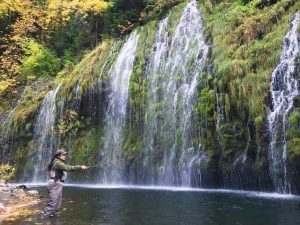
How did your personal journey to conservation begin?
My journey started in high school. I lived in a Buddhist monastery boarding school for 4 years and we had regular high school classes, but also meditation, Buddhist studies, and an organic farm. What I really took from my education was mindfulness and compassion, and that’s where my environmental stewardship was fostered.
I studied environmental policy at UC Davis and also minored in education. I started teaching 1st graders environmental science and was a summer camp counselor. There, I found the intersection of science and policy and realized that I wanted to be the translating bridge between science and policy. In my education work, I learned that you can make a message really fun and engaging for both kids and adults. When you hear scientific reporting in the news or in an article, it’s often full of jargon and sounds super scary, but if you break it down with an analogy and simple terms you can have a greater impact. And that’s where I come in.
What made you decide to embark on this unique high school experience?
It’s an interesting story! You might think – “what kind of 14-year-old sends themselves to a boarding school that seems very restrictive?” It was an autonomous decision. I applied to go to this school in the City of Ten Thousand Buddhas in Ukiah, California. I went there because I attended a 2-week summer camp program and I loved it. I think of Buddhism more as a way of life. There’s a spiritual side and an ethically moral side, and I leaned more into the morality of it and thought a lot about what I can do to help this world. It was a very unique experience for sure.
How did this experience help you grow as an advocate?
Boarding school instilled virtues within me, but it also affected how I carry myself because, at school, I had to fit the perfect mold of an obedient student, and that is not me! I’m very loud and energetic, and I was told so often that my behavior was inappropriate at school so I had to hold all this energy in. It was so hard! After college, I found the United Nations Association, which is kind of a graduated level of model UN. We were advocates for the UN, we would meet with representatives and travel annually to the general assembly in NYC and lobby on Capitol Hill.
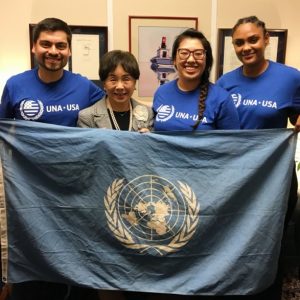
Representing the United Nations Association with Congresswoman Doris Matsui of District 6 in Sacramento, California.
Fast forward a bit to the 2016 election where I was devastated by the results. I remember the day after the election, I wore an all-black pantsuit just to mourn what I was feeling. After a while I was tired of feeling defeated. I found the 2017 Women’s March and felt that I had to go. I got super excited about what I was going to wear to my first protest. I decided to wear a bandanna to channel the “we can do it” attitude. I was excited by seeing and hearing people in pink hats, holding signs, and chanting. By the end of the day, I was tired from marching and my voice was hoarse, but I felt alive and energized! For the next march, I brought my own megaphone because I wanted to be the loudest person when I hit the streets! After three years of doing that, I went to the Global Climate Strike in September 2019, the first real climate strike in a while. I just went by myself, and by the end of it I was leading thousands of people through the streets of San Francisco. At the end of the protest, people came up to me and thanked me for my voice. That was the first time that it really clicked that this is my calling! After all those years of people telling me that I’m being too much and too loud, I am now being thanked for my voice. I realize that my voice, as a first generation Asian-American, queer, female, scientist is necessary and valued in a movement focused on achieving both climate and social justice for all.
What inspired you to dedicate so much of your free time to the Sunrise Movement?
I got started with Sunrise right after that very transformative September climate strike. I ran into a friend who was wearing a Sunrise t-shirt. She told me the Sunrise pitch and I thought that is exactly what I have been looking for: a community of young people inspired to take action. I tried other climate organizations, but it wasn’t the right fit for me. With Sunrise, I resonated with the bright and optimistic name and the principles for which we stand.
I dedicate my free time to this cause because I feel an urgent fire within me to do something about climate change. I need to be actively working on something, whether that’s a social media campaign, non-violent direct actions like sit-ins and protests, or canvassing for presidential candidates or local office. I’ve done a little bit of everything, but I keep going back to that experience teaching 1st graders. I want them to leave with the power and knowledge that they can do something to make a difference. I wanted to empower young people to turn their passion into action, no matter what age.
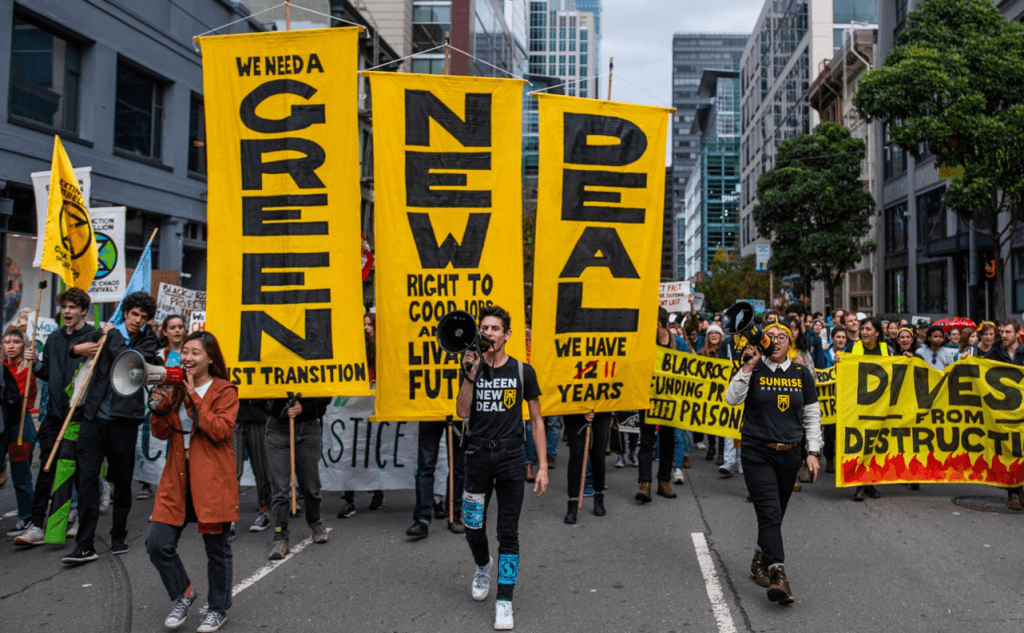
Megan and other activists leading a climate protest for the Sunrise Movement in San Francisco, CA.
You are currently re-thinking your Earth Day plans in light of COVID-19. How has your activism changed?
For Earth Day, we were planning a massive in-person strike in downtown San Francisco. We were also working with other partners like Youth vs Apocalypse, Extinction Rebellion, 350, and other climate organizations. We can no longer have mass gatherings, so we are switching to an online live-stream, which is going to be a 72-hour event. We were originally going to strike for three days. The first day, on Earth Day, would be about organizing for the future; the second day would be focused on Stop the Money Pipeline, asking companies to divest from fossil fuels; and the third day would be about standing in solidarity with Indigenous groups and voting. We still have the same strong messages, but our platform is different. We’re asking folks to tune into a live-stream that will be hosted nationally with smaller breakouts with local focus and interactions. We will have lots of informational sessions but also social sessions to get people involved. We also have a huge digital advocacy campaign with planned banner drops. Part of this campaign is also Calling for Change, which is a push to get folks to call their representatives and ask them to support bills like The People’s Bailout.
You will be recognized as the second Emerging Leader at Virtual River Rally. What are you looking forward to in the next year of engaging with the network of water leaders and protectors?
First of all, I am so honored and excited to be selected as this year’s Emerging Leader! I’m super stoked about that. I am looking forward to engaging in dialogue with other young conservationists across the country and not only share what I am doing, but learn about their work as well. I hope to share my story and inspire others to take action. I have been feeling some imposter syndrome, which is not a unique problem among young people, so I also hope to empower young people to recognize and use the skills and strengths that they have. My path to science is very non-traditional, so I also hope to communicate that you don’t have to follow the formula to make an impact in this sector. I got here through education, communication, making music videos, and combining art and science. We need more of that. I am excited to create more media that combines art and advocacy and inspire others to follow non-traditional paths.
What advice would you give to another young person who is struggling to find their way in the fields of conservation or advocacy?
First, create opportunities for yourself. No one asked me to make videos, I just happened to be good at it and brought that into my work. When I was working at the Center for Watershed Sciences, one of my first jobs, one of the scientists made an augmented reality sandbox. I thought it was so cool! I shot and edited a video and posted it online and NPR Science Friday picked it up. I combined skills I had to create this opportunity and further share our work in creative ways. That’s what I mean by create opportunities for yourself. See how your own skills and strengths can add to a project and just go for it! I felt a ton of imposter syndrome at the time. I was working with Ph.D. scientists and I just had my Bachelor’s degree! I felt so out of my league and felt that I had to prove myself. I quickly realized my unique skills that I brought to the table were my strong education, communication, and media skills. After building my own portfolio, seeing views on my videos go up, earning this award and getting recognition for my unique skills feels so validating. In summary, create opportunities for yourself by combining your unique skills. The world needs your unique energy and passion, and anyone can make change by taking action.






